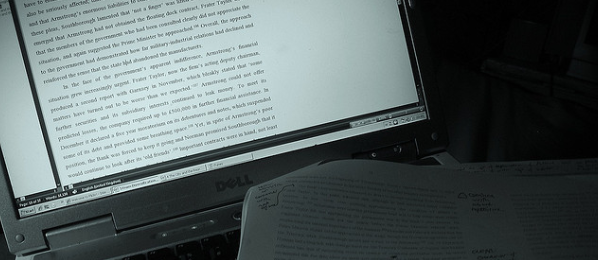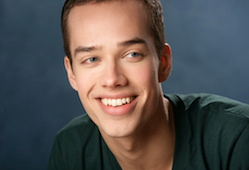The Top Five Things I Learned In Screenwriting Lab

During Film Independent’s recent Screenwriting Lab, we asked a few of the Fellows to tell us about the experience and what they learned. Here’s the first post, by Jonathan Parks-Ramage.
Writing is kind of like a socially acceptable form of schizophrenia. When my writing partner Marla and I work on a screenplay, we speak in voices, occupy alternate realities and inhabit multiple personalities. Which is why it was an incredible relief to find out that we were accepted into the Film Independent Screenwriting Lab. It was a helpful reminder that we are in fact writers, and not just two clinically insane typists.
And so, a month after being accepted, my writing partner and I hauled our crazy selves from New York to LA to participate in the Lab. The month that followed was the most formative experience in our careers as writers thus far. Film Independent is truly an incredible community to join. Its network extends far and wide, and our mentors included some of the most brilliant minds working in film and TV today: James Ponsoldt (The Spectacular Now), Kiwi Smith (Legally Blonde) and Damien Chazelle (Whiplash), just to name a few. The Lab was an invaluable opportunity to workshop Dizzy Izzy, our current feature script, and join the Film Independent family.
What follows is an attempt to crystallize my lab takeaways into a Top 5 List. I honestly feel as though I could’ve chosen 5 million. But in the interest of keeping your Internet attention, I’ve Sophie’s Choiced it down to these few points:
5. Everyone is human and everyone has struggled.
Okay, so you’ve decided to truly commit to this whole screenwriting thing. There are easier career paths you could have chosen—NBA Player is one that comes to mind—but you’ve never been the one to settle for less than the nearly impossible. And well, if you’ve set your sights on the nearly impossible, you’re bound to struggle along the way.
Struggle is often the first thing subtracted from success stories. One of the most refreshing things about participating in the Screenwriting Lab is the opportunity to engage your heroes in an intimate setting and discover that despite their superpowers, they too are real humans who have surmounted difficult challenges to achieve their goals.
Oh, you mean that Damien Chazelle just didn’t roll out of bed one day and become a critically acclaimed, commercially viable indie sensation? The answer, as it turns out, is no. There were years of struggle, crap jobs, and hardcore hustling. Whiplash took four years to make (and it is brilliant, by the way…go see it now, now, now). Listening to him tell his story was a reminder that success never happens overnight. Rather, it happens over many, many nights. These nights may involve hard work, carb-binging, and head-to-wall-banging. But they’re worth it.
4. Network laterally—unless you’re related to Julia Roberts.
The splashiest perk of attending the Lab is the opportunity to work closely with some of the most visionary writers, directors, and showrunners of today. But the hidden perk of attending the Lab is the opportunity to work closely with some of the most exciting directors, writers, showrunners of tomorrow: your peers. My fellow Fellows are some of the most inspiring writers I’ve met—all at emerging stages of their careers. It’s a group of driven, talented and kind people who are all in the same boat. And well, if you’re all in the same boat, you might as well row together—you get to shore faster.
This of course does not apply if Julia Roberts is your aunt. If Julia Roberts is your aunt, then by all means—just get famous already.
3. Be nice.
That’s pretty much it. People want to work with you if you’re nice. People don’t want to work with you if you’re mean. I think most people understand this intuitively. But it was helpful to be reminded that nice guys don’t finish last, they actually get hired.
2. Sometimes your baby needs a new look.
Okay, so you’ve written this script, and this script is your baby. You, being the proud parent, see only the best in your baby. It is hard to imagine that this thing that you birthed after hours and hours of arduous labor could be anything less than perfect. But, as it turns out, proud parents don’t always have the power to evaluate their offspring objectively. To realize its full potential, your baby might need a better stroller, different diapers or even a small fedora.
Fresh perspective can be hard to come by, especially when you’ve been staring at the same 100 pages for months on end. My writing partner and I came to the Lab with open minds and a desire to shape our baby into the best script possible. The workshop setting allowed us to dive deep, work closely with mentors to refine our work, and hear the varied and valuable perspectives of our peers.
The Lab process ultimately helped us find the heart of our movie, and discover a more streamlined structure. Our baby is now on its way to becoming a fully formed, fashion-forward toddler.
1. The work wins in the end.
In one of our final Lab sessions, a prominent manager presented a foolproof equation for success as a screenwriter: write a great script.

It is, of course, essential to be driven, charming and tenacious. But although hustle can get you in the door, what’s on the page is what gets you remembered.
I will certainly remember all my fellow writers in the Screenwriting Lab. And I feel confident that you too, dear reader, will someday remember them as well.
Jonathan Parks-Ramage / Film Independent Screenwriting Fellow @jpramage